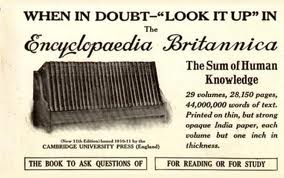DICTA
March 30, 2012 § 2 Comments
- State trial courts’ use of judicial interrogation and Daubert gatekeeping techniques are highlighted in this interesting article at the Social Science Research Network. The trial judge as interrogator is a subject I’ve talked about here before. And I touched on Daubert analysis step by step at this post and here.
- A few of you may be old enough to remember door-to-door salesmen. They came to our homes bearing all manner of goods. One particular specie of the sales creature was the encylopedia salesman, and I am sure many sets of Collier’s, World Book, Americana, Book of Knowledge, and the venerable Brittanica arrived on household shelves (often to gather dust) across America via those Willy Lomans of yesteryear. Now the word is that Encyclopedia Brittanica is suspending print publication after 244 years. You will still be able to access it online by subscription, but I wonder, in an age when genuine scholarship seems to be demanded less and less in our schools, whether it will survive against the less authoritative but free online Wikipedia. We’ll see.
- Speaking of Wikipedia, Ohio State University’s Journal of Law and Policy for the Information Society has an interesting article in .pdf on citations to Wikipedia in law review articles.
- The 10 most popular law schools (highest percentages of accepted applicants who enroll) and the top ten with an increase in enrollment for 2011-2012.
- Clifford Winston in the NYT says law schools and bar exams are unnecessary and the legal profession should be deregulated. Andrew Ziaja disagrees. Articles from Oct 2011 that I’ve only now come across.
- Should law school be more academic or more practical? That is the question behind this article: The Better Angels of Our Profession.
- Looking to the flip, non-angelic, side of the profession, Tom Freeland at NMC blog continues his coverage of the Scruggs saga with reportage of the testimony and analysis of Scruggs’ motion to withdraw his guilty plea in Scruggs II (which involved then-Judge DeLaughter). Freeland’s coverage is day by day, and linked is only one day. You will have to click around on the site to catch all of the proceedings, but it is fascinating reading, as it has been for the nearly six years that the criminal cases have been pending and Freeland has been covering from his unique vantage point next door to the federal court house in Oxford.

Your Honor, would you care to expond on Miss.Code Ann. 11-53-17 through 21, regarding In Forma Pauperis filings? Especially in view of Boddie v. Connecticutt, 401 U.S. 317, 374, 383 (1971). Some local clerks are requiring the party, and us, to prove they’re paupers first before accepting a pauper filing. I say the statute allows the clerk no discretion to accept a pauper filing and may challenge the pauper status only after accepting the proffered pleadings. Unfortunately, there is little guidance in the reported Mississippi cases. I would appreciate your opinion.
I believe the answer is in MRCP 3(c), which may be construed to supersede the statute (see the order adopting the MRCP, which states that, ” … in the event of a conflict between these rules and any statute … these rules shall control”). Rule 3(c) provides that The costs “may” be waived on pauper’s affidavit, but the court may review whether to allow waiver on motion of a party, or the clerk, or on its own motion. As a matter of practice in this district, I understand that the clerk requires a completed 8.05 financial statement with the affidavit, and if there is a question the clerk presents the matter to a chancellor for review. Remember that Boddie v. Connecticut begins with a finding that the appellants were unable to afford the filing fee. Absent that finding, the case fails. Likewise, in order to invoke pauperity, the affidavit is first filed. If the affiant is unhappy with the clerk’s action, he or she may have it reviewed by the chancellor per Rule 3(c). If the clerk is not satisfied with the affidavit for some reason, he or she may have the chancellor look at it and make the call. Or the judge may review on his or her own initiative. Your experience from district to district and from chancery clerk to chancery clerk will vary.